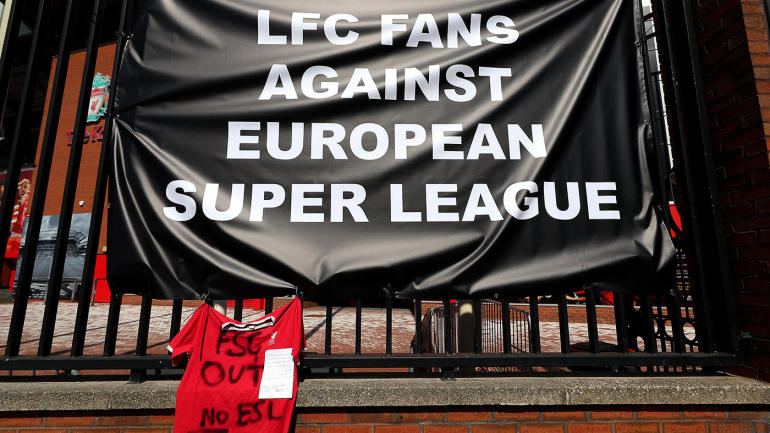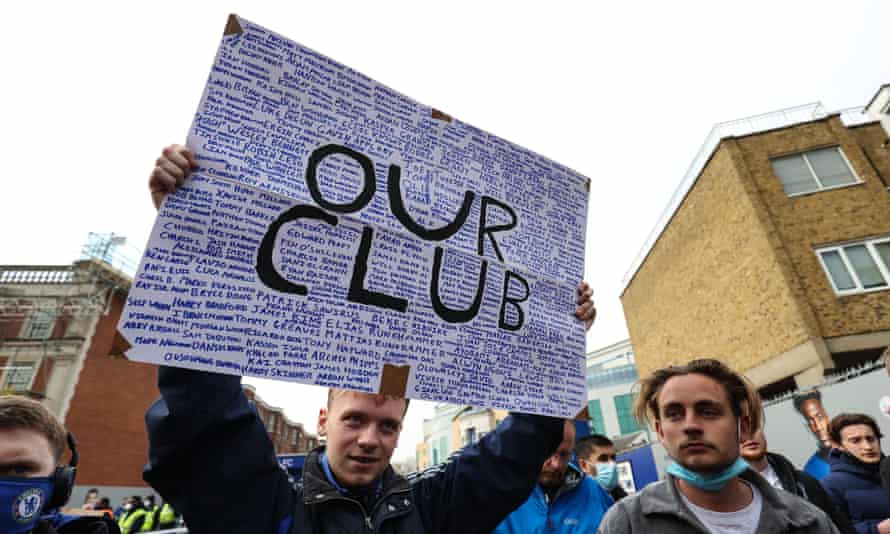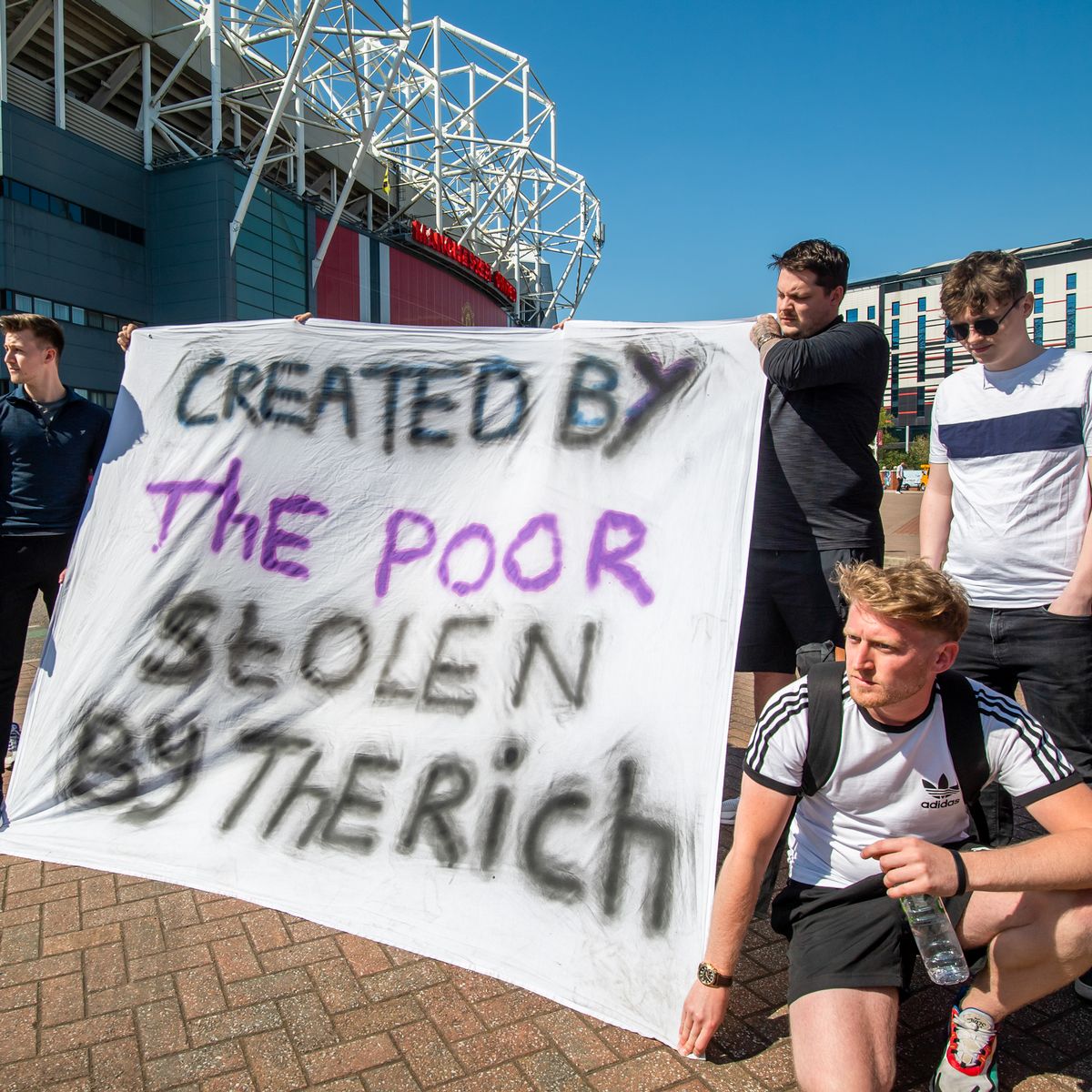
Football, by far the most popular sport in the world, occupies a strange but interesting place in how we understand contemporary capitalism.
On the one hand, the growth of an urbanised working class in the late nineteenth century and the commercialisation of the sport marched hand in hand. It’s no accident that most of our football clubs and their leagues date from the 1880s and 90s.
Yet the emotions football generates transcend the game’s capitalist origins. Clubs matter to their supporters in a way unmatched by other commercial products. Now, the assertion of “fan power” against football club owners’ greed to maximise their profit has proved a heartening conclusion to the recent controversy that swept European football.
Not many proposed capitalist ventures in history created such vehement and precipitous hostility as the European Super League (ESL). Barely two days after the elites of European football announced earlier this month that they were entering a breakaway super league, the project was in tatters.
The scheme fell apart following intense campaigning that involved fans publicly burning football shirts; managers pronouncing their dismay in irate interviews; “Shame on You” banners hung on the gates of football clubs, and other acts of defiant insurgence.
No sooner had the continent-wide contempt reached full throttle than the ill-fated project collapsed and its founding members, desperate to placate the angry mob, issued repentant statements in a bid to win back public support.
Even Boris Johnson got in on the mass hysteria, spinning the yarn that likens him to a freedom-loving libertarian, as he promised to use a “legislative bomb” to scupper the breakaway competition if football authorities failed to thwart the move on their own.
Fortunately, Johnson’s bomb wasn’t detonated, saving the PM from committing his latest act of hypocrisy after his own government voted last month in favour of new laws aimed at cracking down on our most basic freedom: the right to protest.
Examples of capitalist ventures overthrown by objectors are few and far between. The planned High Speed 2 (HS2) railway across Britain has created a wave of high-profile opposition on environmental and economic grounds. But despite campaigners regularly pinning themselves to trees in protest, earlier this year the government gave the HS2 project the green light and construction work is now underway.
Compared to the European Super League, opposition to the HS2 railway was fated to lose from the offset for one primary reason: it wasn’t football.
The outpouring of anger towards the proposed Super League – which would have seen a group of 12 clubs from across Europe’s biggest leagues given a permanent spot in the competition, stifling the soul of football elsewhere – confirmed that when it comes to the “People’s Game” of entrenched working-class communities, fans weren’t prepared to let capitalists have another stab at transforming the sport for the worse.
The sport has been transmuting under capitalism for years. As the most successful football clubs owned by billionaires grow richer, long-established community clubs are slowly diminishing in their shadows.
In the North West of England, the wealth divide between the richest and most successful clubs, and a series of community clubs that have struggled to make ends meet, is stark. At the top of the Premier League is Manchester City and Manchester United. Worth $4.2 billion, Manchester United is the world’s fourth richest football club. With a fortune of $4 billion, Manchester City is the sixth richest.
Meanwhile, neighbouring clubs are facing financial turmoil. Following a decade of monetary upheaval that ended in administration, Bolton Wanderers, a once mainstay of the Premier League, was relegated to League Two. Stockport County flew high in the 1990s, reaching the League Cup semi-finals before nose-diving into financial tatters, going into administration in 2009, and dropping into lower league obscurity ever since.
At the heart of free-market capitalism is competition. By stifling competition, namely thwarting the opportunity for promotion and relegation, it could be easy to deduce that the ESL would have gone against the grain of free-market capitalism. It wasn’t, however, quite like that. It was based on the ills of free-market capitalism.
One such ill is that a competitive environment creates a survival of the fittest atmosphere. Another is that when wealth is not distributed equally, a small percentage of society acquires the wealth while the majority scrabble to get by. Such ills could be attributed to football, where the survival of clubs is seemingly dependent on their wealth.
With the free-market model, the economy is decided by “fair” competition – as long as you are one of a handful of people – or in the case of the European Super League, one of a handful of clubs – who are allowed to compete.
Writing in the Independent, Mark Steel noted how the participating ESL club owners were merely applying the rules of business they have earned to football.
“In business, a company is bought by investors who have little interest in the product, only the share price. In fairness, the football owners have tried to follow this rule,” Steel wrote. “For example, one creator of the Super League was Real Madrid president Florentino Pérez, who said football must change the length of the game, as ‘90 minutes is too long.’”
In the case of the ESL debacle, the power of the genuine football supporter seemed to be grossly underestimated by the greed in the upper ranks of the game. The scale and breadth of the outpouring of opposition literally brought the venture to its knees.
My two football-mad sons were among the huge fraternity of multi-generational supporters threatening to abandon their club and love of the sport if the competition had gone ahead. Contemplating losing long-established, multi-generational support for Manchester United – nearly inconceivable given that their grandfather had played for the Manchester United Junior Athletic Club (MUJAC) in the 1950s – could not have been easy for my 12- and 14-year-olds, especially as youngsters who are finally getting back into playing grassroots football after a catastrophic year of disruption.
The right wing magazine The Spectator, which seems to be among the minority of publications in support of the European Super League, may speculate that football’s billionaires will win in the end.
But given my sons’ very real threat to give up the sport and club they love, and the outpouring of anger from fans around the world, I beg to differ. Football is one thing even the fattest of fat-cat billionaires can’t completely control.
At the same time, we should not be too carried away. The self-same owners will surely be back soon with more schemes to wring further profit from their investments. I can't see the talk of introducing a “German” system of fans having a 51 percent stake in clubs being anything more than talk.
At a still deeper level, wouldn't it be something if people translated their passions around football toward making progress in other institutions that impact our lives? “Give us back our energy companies, our post office, our schools.” Perhaps we’ll have to wait a while longer before we hear those cries demanding – and achieving – change.















